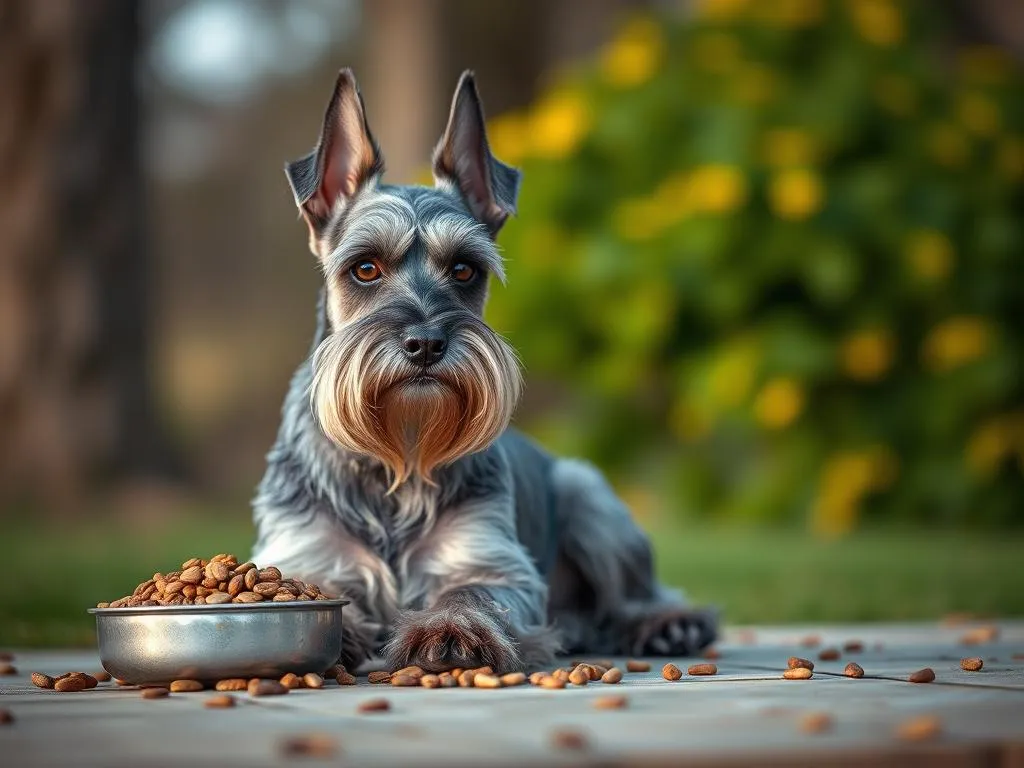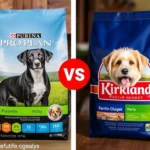
Proper nutrition is vital for your dog’s overall health and well-being. When it comes to feeding your Schnauzer, understanding their unique nutritional needs is essential. Schnauzers are a beloved breed known for their distinctive appearance and lively personalities. Whether you have a Miniature, Standard, or Giant Schnauzer, their nutritional requirements can vary significantly.
Understanding Schnauzers
Breed Characteristics
Schnauzers come in three distinct sizes: Miniature, Standard, and Giant.
- Miniature Schnauzers typically weigh between 11-20 pounds and stand around 12-14 inches tall.
- Standard Schnauzers weigh between 30-50 pounds and stand around 17-20 inches tall.
- Giant Schnauzers are the largest, weighing between 55-85 pounds and standing 23-27 inches tall.
All Schnauzers are known for their energetic and playful nature, which requires a diet that supports their active lifestyle. However, they can be prone to certain health issues, such as hip dysplasia, pancreatitis, and certain skin conditions. These potential health concerns must be considered when selecting the best dog food for Schnauzers.
Nutritional Needs
Schnauzers require a well-balanced diet rich in essential nutrients. Key components include:
- Proteins: Vital for muscle development and overall health.
- Fats: Important for energy and skin health.
- Carbohydrates: Provide a quick energy source.
- Vitamins and Minerals: Support various bodily functions and immune health.
Tailoring their diet based on age, size, and any specific health issues is crucial to meeting their unique nutritional needs.
Key Nutrients for Schnauzers
Proteins
Proteins are the building blocks of your Schnauzer’s body, playing a crucial role in growth, maintenance, and repair of tissues. High-quality protein sources include:
- Chicken
- Turkey
- Fish
- Lamb
Look for dog foods that list meat as the first ingredient, ensuring your Schnauzer gets the best quality protein available.
Fats
Healthy fats are essential for maintaining energy levels and promoting a healthy coat. They also aid in the absorption of fat-soluble vitamins. Recommended sources of healthy fats include:
- Fish oil
- Chicken fat
- Flaxseed oil
These fats not only provide energy but also contribute to healthy skin and a shiny coat, which is particularly important for Schnauzers due to their wiry fur.
Carbohydrates
Carbohydrates are an important source of energy for dogs. However, it’s important to choose the right sources. Look for:
- Brown rice
- Sweet potatoes
- Oats
These complex carbohydrates provide sustained energy and support digestive health.
Vitamins and Minerals
Schnauzers need a variety of vitamins and minerals for optimal health. Key vitamins include:
- Vitamin A: Supports vision and immune function.
- Vitamin D: Helps with calcium absorption for strong bones.
- B Vitamins: Important for energy metabolism.
Minerals like calcium, phosphorus, and magnesium are also crucial for bone health and overall well-being. To ensure a balanced intake, choose high-quality dog food that meets AAFCO (Association of American Feed Control Officials) standards.
Types of Dog Food
Dry Dog Food (Kibble)
Kibble is one of the most popular choices for dog owners. Its benefits include:
- Convenience: Easy to store and measure.
- Dental Health: Crunchy kibble can help reduce plaque buildup.
- Variety: Wide range of formulations available.
When selecting kibble, look for brands that focus on high-quality ingredients and have specific formulations for Schnauzers.
Wet Dog Food (Canned)
Wet dog food is another excellent option, especially for Schnauzers that may be picky eaters or need extra hydration. Benefits of wet food include:
- Hydration: Contains higher moisture content, which helps keep dogs hydrated.
- Palatability: Often more appealing to dogs due to its aroma and texture.
When choosing wet food, look for options that are grain-free and made with real meat.
Raw Diet
The raw diet, often referred to as the BARF (Biologically Appropriate Raw Food) diet, consists of raw meat, bones, fruits, and vegetables. Benefits might include:
- Improved coat condition
- Better digestion
- Higher energy levels
However, there are risks involved, such as nutritional imbalances and potential bacterial contamination. Consult with a veterinarian before transitioning to a raw diet.
Home-cooked Meals
Cooking for your Schnauzer can ensure they receive fresh, wholesome ingredients. Guidelines include:
- Balanced Diet: Include proteins, healthy fats, carbohydrates, and necessary vitamins and minerals.
- Avoid Harmful Foods: Certain foods like chocolate, onions, garlic, and grapes are toxic to dogs.
Key ingredients to include are lean meats, vegetables like carrots and peas, and whole grains like brown rice.
Factors to Consider When Choosing Dog Food
Age and Life Stage
Schnauzers have different nutritional needs based on their life stage:
- Puppies: Require a diet high in protein and fat for growth.
- Adults: Need a balanced diet to maintain their energy levels and health.
- Seniors: Often benefit from lower-calorie diets to prevent obesity and joint issues.
Selecting the right food type for each life stage is crucial for their health.
Health Conditions
Schnauzers are prone to several health issues, including:
- Pancreatitis: May require a low-fat diet.
- Skin allergies: A hypoallergenic diet may be necessary.
Consulting with a veterinarian can help determine the best dietary approach for managing these conditions.
Allergies and Sensitivities
Food allergies can manifest as skin issues, gastrointestinal problems, or behavioral changes. Signs of food allergies in Schnauzers may include:
- Itching and scratching
- Digestive disturbances
- Ear infections
If you suspect your Schnauzer has a food allergy, consider hypoallergenic dog food options that eliminate common allergens like grains and specific proteins.
Recommended Brands and Products
Top Commercial Dog Food Brands for Schnauzers
When searching for the best dog food for Schnauzers, consider these reputable brands:
- Royal Canin: Offers breed-specific formulas designed for the unique needs of Schnauzers.
- Hill’s Science Diet: Known for its balanced nutrition and veterinarian-recommended formulations.
- Wellness Core: Grain-free options packed with protein and essential nutrients.
These brands provide high-quality options tailored to your Schnauzer’s needs.
Budget-Friendly Options
High-quality dog food doesn’t have to break the bank. Consider these affordable yet nutritious options:
- Purina Pro Plan: Offers a range of options, including formulas for sensitive stomachs and skin.
- Blue Buffalo Life Protection Formula: A well-balanced diet with real meat as the primary ingredient.
These brands provide good nutritional value without compromising quality.
Feeding Guidelines
Portion Control
Determining the right portion size for your Schnauzer is crucial for maintaining a healthy weight. Factors that affect portion sizes include:
- Activity Level: More active dogs may require larger portions.
- Weight: Overweight dogs may need reduced portions.
- Age: Puppies usually need more food than adults.
Refer to the feeding guidelines on your dog food packaging and adjust based on your Schnauzer’s specific needs.
Feeding Schedule
Establishing a consistent feeding routine can benefit your Schnauzer’s digestion and behavior. Recommended feeding frequency includes:
- Puppies: 3-4 meals per day.
- Adults: 2 meals per day.
- Seniors: 1-2 meals per day, depending on their health.
Consistency helps regulate their appetite and supports overall health.
Conclusion
Understanding the best dog food for Schnauzers is essential for ensuring their health and happiness. From their unique breed characteristics to their specific nutritional needs, a tailored diet can make all the difference. Always consult with a veterinarian to create a personalized nutrition plan that fits your Schnauzer’s age, activity level, and health conditions. By maintaining a balanced diet, you’ll be helping your Schnauzer lead a vibrant and healthy life.









